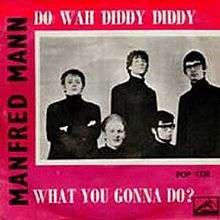Do Wah Diddy Diddy
| "Do Wah Diddy Diddy" | ||||
|---|---|---|---|---|
 | ||||
| Single by Manfred Mann | ||||
| from the album The Manfred Mann Album | ||||
| B-side | "What You Gonna Do?" | |||
| Released | 10 July 1964 | |||
| Format | Vinyl record | |||
| Recorded | 11 June 1964 | |||
| Genre | Pop rock | |||
| Length | 2:23 | |||
| Label |
HMV POP 1320 (UK)[1] Ascot (US) Capitol (Canada) | |||
| Writer(s) | Jeff Barry, Ellie Greenwich[1] | |||
| Producer(s) | John Burgess[1] | |||
| Manfred Mann singles chronology | ||||
| ||||
"Do Wah Diddy Diddy" is a song written by Jeff Barry and Ellie Greenwich and originally recorded in 1963, as "Do-Wah-Diddy", by the American vocal group The Exciters.
It was soon covered by British R&B, Beat and pop band Manfred Mann.[2] Manfred Mann's version, which was more commercially successful, was recorded on 11 June 1964, released on 10 July,[3] and spent two weeks No. 1 in the UK Singles Chart in August,[4] and two weeks at the No. 1 spot in the U.S. Billboard Hot 100 in October.[5]
Covers
The song has been covered many times, notably by DJ Ötzi whose version titled "Do Wah Diddy" charted peaking at #9 in Ö3 Austria Top 40, also charting in Germany, Switzerland, UK and Ireland.
In popular culture
It was also used as the theme song for Ang TV, a famous youth-oriented variety show in the Philippines from 1992-1997.
See also
References
- 1 2 3 Rice, Jo (1982). The Guinness Book of 500 Number One Hits (1st ed.). Enfield, Middlesex: Guinness Superlatives Ltd. p. 82. ISBN 0-85112-250-7.
- ↑ Roberts, David (2006). British Hit Singles & Albums (19th ed.). London: Guinness World Records Limited. p. 166. ISBN 1-904994-10-5.
- ↑ Archived May 25, 2006, at the Wayback Machine.
- ↑ "All the Number One Singles: 1964". The Official Charts Company. Retrieved 13 June 2010.
- ↑ Bronson, Fred (1992). The Billboard Book of Number One Hits (3rd ed.). New York, NY: Billboard Publications, Inc. p. 158. ISBN 0-8230-8298-9.
External links
| Preceded by "A Hard Day's Night" by the Beatles |
UK Singles Chart number-one single 13 August 1964 (2 weeks) |
Succeeded by "Have I the Right?" by the Honeycombs |
| Preceded by "Oh, Pretty Woman" by Roy Orbison |
Billboard Hot 100 number-one single 17 October 1964 (2 weeks) |
Succeeded by "Baby Love" by the Supremes |